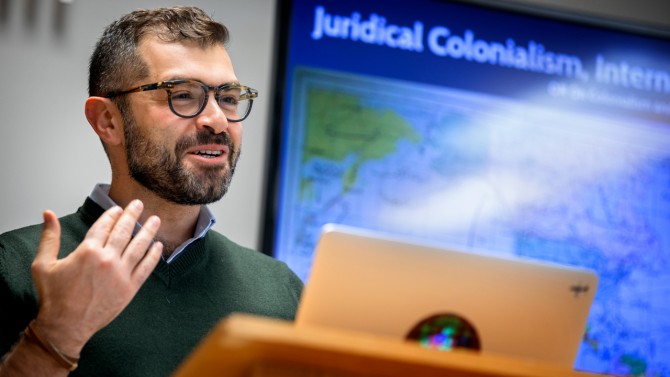Historian examines manipulation of international law
By Linda B. Glaser
The final painting historian Mostafa Minawi shared in his Nov. 29 talk on the Ottoman Empire’s struggle for survival said it all: In the foreground, European delegates stand energetically discussing the partitioning of the African continent. The sole representative of the Ottoman Empire in the painting is hunched over in a chair, hand covering his face and identified only by the fez he wears. The powerless figure, ignored and marginalized, visually depicts the fate of the Ottoman Empire in its negotiations with Europe over Africa’s division.
In the late 19th century, the Ottoman Empire’s future was in doubt, Minawi explained in his talk, “Juridical Colonialism, International Law and the Ottoman Response.” Bankrupt, having lost most of the Balkans and other territory in war, the Ottoman government turned its ambitions southward, toward East Africa. But there they also faced competition, from their Russian enemy and from European claims on territory. But because the empire had been accepted into the European “family of nations” in 1856, the Ottoman government had hopes of being an equal partner in European negotiations over the Sahara and the African Red Sea coast.
But Europe had a three-tiered system that inspired how it dealt with other powers, explained Minawi, assistant professor of history and the director of the Ottoman and Turkish Studies Initiative. Europe was civilized, and European countries held respected legal sovereignty over their territories. The Ottoman Empire was considered only semi-civilized; hence, it did not merit the legal protections over its territories that European nations enjoyed. Africa, to the Europeans, was entirely uncivilized and thus had no say in its own governance. International law, said Minawi, was used by the European great powers as a colonial tool. The Europeans increasingly relied on legalistic justifications for their colonial expansion in Africa, which Minawi termed “juridical colonialism.”
The Conference of Berlin, convened in 1884, was intended to decide how the parts of Africa not already under European rule would be “legally” divided. “The conference was a way to set rules instead of fighting,” said Minawi. “At the conference the European powers could create new laws [about how to divide up the territory] and thus make whatever they decided legal. The African locals were not represented or consulted.” The 1885 Act of Berlin gave European powers the legal right to claim new land in Africa – any empire that already possessed land along the coast got first dibs on occupying the hinterland behind that coast. To make that claim, the power would have to prove “effective occupation.”
“It meant you can’t just stick in a flag, you have to have boots on the ground,” said Minawi.
But when it came to the Ottoman Empire’s claims, it meant no such thing. Despite some areas being policed by soldiers in Ottoman uniforms, the European powers ignored Ottoman claims entirely and found ways around legal agreements that favored the Ottomans. Pleas from the Ottoman emperor and his representatives fell on deaf ears. The Ottoman Empire’s diplomatic efforts to hold onto territory in Africa – much less lay claim to additional territory – ended in failure. Without the military and economic means to back up their diplomatic efforts, the Ottoman Empire lost its African territories. Despite being present at the conference and ultimately a signatory to the Act of Berlin, Ottoman diplomats quickly discovered themselves also shut out of the negotiations over what they considered to be their spheres of influence.
“The Ottomans asserted their right even over land that was at the time of little economic value, like the eastern Sahara,” said Minawi. “The reality is that they weren’t asserting their right to the land but their sovereignty. If you are not allowed to colonize, then you are colonizable, thus risking their very own sovereignty.”
Minawi’s talk was hosted by the Institute for Comparative Modernities and co-sponsored by the Departments of History and Near Eastern Studies and the Ottoman and Turkish Studies Initiative.
Linda B. Glaser is a staff writer for the College of Arts and Sciences.
Media Contact
Get Cornell news delivered right to your inbox.
Subscribe